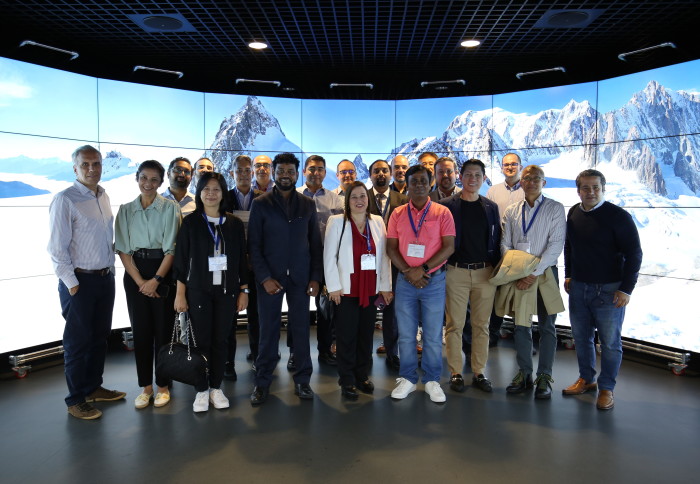Senior healthcare leaders from 14 countries visit Imperial's Data Observatory
by Gemma Ralton

International hospital CEOs attended the DSI as part of the Innovative Hospital programme to learn more about the use of big data in healthcare.
Organised by Imperial’s Centre for Continuing Professional Development, the Innovative Hospital Programme brings together healthcare leaders including clinicians and hospital CEOs from across the globe to better understand the role that big data serves in improving the quality of hospital care, along with addressing current economic and policy issues facing healthcare systems.
On 24 August 2022, as part of the 4-day programme, over 20 senior healthcare leaders visited the Data Science Institute, where Research Fellow Dr Ovidiu Serban introduced them to different projects, demonstrating the power and benefit of data science to help improve healthcare and inform better decisions.
For example, Dr Serban highlighted the SENTINEL project which uses recent developments in machine learning to filter through social media to help detect disease outbreaks earlier than traditional methods, which can be highly useful for public officials.

Tools to sort COVID-19 datasets
Another of the projects Dr Serban gave an overview of was the recent collaboration with commercial partners AWS, MirrorWeb and CloudWick, where data scientists at Imperial have helped to develop a new platform called Realtime Data Synthesis and Analysis (REDASA), to help curate and filter large amounts of complex information in a short amount of time.
The team used REDASA to create one of the world’s largest and most up-to-date sources of COVID-19-related evidence, consisting of over 104,000 documents.
While the huge scale of the scientific response to the COVID-19 pandemic has unquestionably saved lives, the sheer volume and velocity of new information published each day has triggered an unprecedented ‘infodemic’ – an overabundance of information both online and offline.
By combining the knowledge of medical experts, with the efficiency of an artificial-intelligence-enabled engine, the team developed a data extraction methodology to filter out documents representing only the most relevant and important information about COVID-19. This new method can be applied to other extensive datasets in the future and represents just one example of how data science techniques can be useful to the healthcare sector.
This article features part of an Imperial News Story to find out more read the full article.
Article text (excluding photos or graphics) © Imperial College London.
Photos and graphics subject to third party copyright used with permission or © Imperial College London.
Reporter
Gemma Ralton
Faculty of Engineering